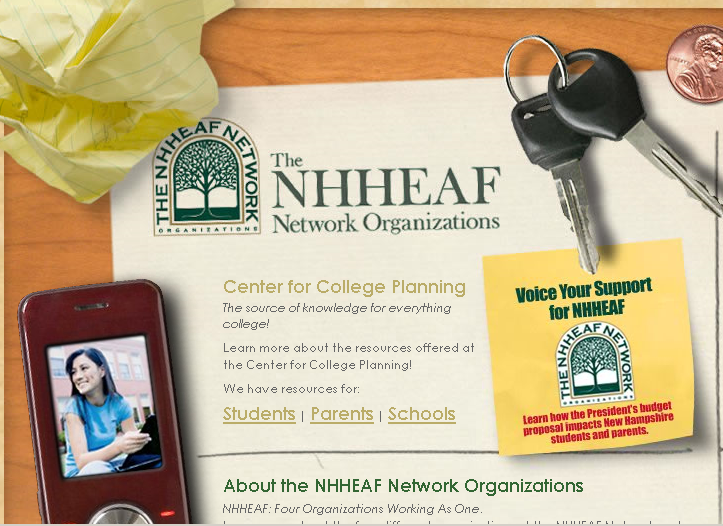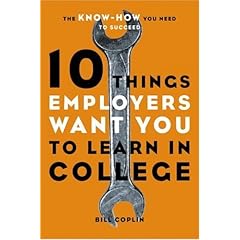Posted on Sep. 30th 2009 by Amelia
The recent enactment of H.R.3221 The Student Aid and Fiscal Responsibility Act of 2009 by Congress has many students wondering what impact the new changes will have on them and their student loans.
According to the Seattle Times, “Congress’ overhaul of the college student-loan system offers welcome relief to students at risk of drowning in debt.”
But, while many are applauding the proposed changes, others are taking a more skeptical view. Today we offer readers a Q & A with Tara Payne of the New Hampshire Higher Education Assistance Foundation. Ms. Payne currently serves as the Vice President of Corporate Communications for the NHHEAF Network Organizations.
 The New Hampshire Higher Education Assistance Foundation (NHHEAF) was established in 1962 to guarantee student loans. Since 1965, it has been the designated guarantor for the Federal Family Education Loan Program (FFELP) in New Hampshire.
The New Hampshire Higher Education Assistance Foundation (NHHEAF) was established in 1962 to guarantee student loans. Since 1965, it has been the designated guarantor for the Federal Family Education Loan Program (FFELP) in New Hampshire.
As one major function, NHHEAF is responsible for the initial application, disbursement of funds, default prevention, default collections, and oversight of the federal loan programs. For fiscal year 2008, NHHEAF guaranteed over $213 million in federal loans and the agency continues to rank among guarantors recording the nation’s lowest default rates.
Yet under the proposed legislation, NHHEAF, one of those so-called ‘middlemen’ in the loan process, might no longer exist. Such a scenario led us to the agency to try and gather additional perspective on the legislation.
We were fortunate to have the opportunity to pose a number of very specific questions to a person with more than a decade of experience at the organization. Ms. Payne offers a wealth of perspective having helped construct the organization’s Center for College Planning department. Today, that department reaches almost 30,000 New Hampshire students and parents each year, offering free college planning, financial literacy and financial aid expertise via presentations, materials and websites.
Can you explain in brief terms exactly what Congress is debating and the rationale for the debate? What is meant by the phrase, the new loan process will “cut out the middle man?”
The President’s budget proposal includes the elimination of the Federal Family Education Loan Program (FFELP). As a FFELP provider, the NHHEAF Network Organizations (NHHEAF) is involved in funding, originating, disbursing and servicing student loans for New Hampshire students from our New Hampshire office. The Presidents budget eliminates the local role in the student loan process. The government’s language about “middlemen” implies that agencies like ours are a “cog in the wheel”, not a major source of community support for families, schools and citizens of our state.
New Hampshire’s program is managed by a nonprofit FFELP provider. This means that proceeds from the loan program are reinvested in our community. We reinvest into strong financial literacy programs, early college awareness and financial aid preparation for students and their families at K-12 schools.
We employ 200 New Hampshire residents who are truly dedicated to supporting student loan borrowers. Our success is evident in NHHEAF having among the lowest default rates in the nation. When these local services go away, students suffer.
Our focus is on increasing aspirations, providing funding and best-in-class service. No government program can replace this local resource. As a school counselor who utilizes our programs shared recently, “NHHEAF is the best thing to happen to higher education since I started teaching in 1974.”
In what ways would students and parents be positively impacted by this legislation? Are there any potential negatives?
The legislation includes several positive aspects including increased Pell Grant funding for the lowest income students and increased funding and support for community colleges. Supporting New Hampshire’s low income students is essential to our mission. We fully support any effort to provide additional funding to the neediest students.
However, under current legislation, FFELP would be eliminated and yet Pell would still not be an entitlement. “Eliminating subsidies to lenders” is a politically-charged cry for support. The public hears this and reacts with unbridled support … assuming that those subsidies will go into making the program less expensive for them.
As Bill Spiers, the Financial Aid Director of Tallahassee Community College described, “While the media has focused on the profitability in the FFELP program, little has been said about the fact that the federal government must fund Federal Pell Grant Program increases off the backs of student borrowers.
The government borrows money at very low rates, much lower than those available to lenders, yet the government would continue to charge the same interest rates as FFEL lenders. Under the current proposal the “federal government isn’t providing any breaks to the students and is actually making more off the program than lenders ever could”
While most student borrowers pay a fixed 6.8% interest rate on federal student loans and parent borrowers 8.5%, lenders in the FFELP are required to pay back the difference between what borrowers pay and today’s lower market yield to the federal government.
The difference between the cost of funds and the borrower rate of interest is even greater in the Direct Loan program, so much that the proposed record increase in Pell Grants would be largely funded from the interest rate spread the Department of Education will enjoy from student and parent borrowers paying a far higher rate of interest on their federal education loans than the federal government is paying on its borrowing costs. Enacted legislation required that loans made on or after July 1, 2006 carry a higher fixed rate for students and parents that is not market driven. Had interest rates remained variable, Stafford loans today would have been an extremely favorable 1.88% (in school and grace) interest rate (2.48% repayment rate), and PLUS loans would be at 3.28% in the current low interest rate environment.
Will these changes have any impact on the FAFSA application process?
 The CEO of our agency, Mr. Rene Drouin, actually sits on the Federal Advisory Committee for Financial Assistance and has been an advocate for these changes which simplify the financial aid process for students. By reducing the number of questions and simplifying the FAFSA form, families may not be as intimidated. Still, while shortening the form may help for those already committed to going to college, it will not increase college aspirations.
The CEO of our agency, Mr. Rene Drouin, actually sits on the Federal Advisory Committee for Financial Assistance and has been an advocate for these changes which simplify the financial aid process for students. By reducing the number of questions and simplifying the FAFSA form, families may not be as intimidated. Still, while shortening the form may help for those already committed to going to college, it will not increase college aspirations.
When our staff visits schools in communities like Colebrook and Nashua and Portsmouth and Keene, we offer consistent support which encourages education beyond high school and personalized assistance filing the forms and understanding the award letters for free. Ninety-three percent of New Hampshire high schools invite our full-time college counselors to their schools to educate their students and families throughout the academic year.
Which types of loans will be impacted: Stafford, Plus Loans, Consolidated Loans?
All federal student loans.
How will the legislation impact colleges and universities?
It is important to note that the Direct Loan program has been around since the Clinton administration. To offer some perspective on the use of Direct Loans in New Hampshire, consider that in fiscal year 2008, FFELP loan volume was at $409 million for 89,000 borrowers. Federal Direct Loan volume was only $13 million for fewer than 3,000 borrowers.
Nationally, 70% of post-secondary schools chose to work with FFELP because of the strong technological, programmatic and financial literacy programs it offers. Now, they will have no choice. And, they will have no local support.
Right now, NHHEAF has a full-time staff which provides a hotline, technical support and regular visits to schools for financial literacy activities for their students. NHHEAF also has a strong Compliance Department which ensures that schools have local support for any regulatory or student-eligibility questions that might arise. Both departments also provide in person training and webinars on a range of professional topics.
Supporting the financial aid professionals goes hand-in-hand with supporting the student borrowers on their campuses. Further, the proposal assumes that the government can effectively and efficiently run a program this large. It is estimated that 4,400 schools will be forced to convert from FFELP, their program of choice, to the Direct Loan program on July 1, 2010.
The U.S. Department of Education will be tasked with converting an average of nearly 500 schools a month over the course of a nine month period. Since the Direct Loan program’s inception in 1993, roughly 1,600 schools have been converted over a 16 year timeframe. For schools currently in the FFEL program, this would mean investing staff, time and money to change systems and processes at a time where budgets have been cut to the core. It’s realistic to imagine that those costs may have to be absorbed through increased tuition and student fees.
 Will anyone theoretically be hurt by these changes? If private banks lose this source of revenue, what negative impact might it have on their role as lending institutions within the community?
Will anyone theoretically be hurt by these changes? If private banks lose this source of revenue, what negative impact might it have on their role as lending institutions within the community?
Minimally, 40,000 jobs are at stake across the nation. For agencies like ours, student loans are the only source of revenue. It would be devastating. And, the impact on the local economies would be brutal. Consider that in NH alone, NHHEAF spent $6.8 million on local vendors and contributed $5.1 million in charitable spending. Multiply that by all of the agencies like ours across the country and it is severe. And, again, at the end of the day, will most college-bound families experience any significant savings? It is unlikely.
The amount that could be saved by the Federal Government is projected to be in the billions of dollars – based on the current legislation as proposed what is the plan for this money? Will it be used to attack the current federal deficit or will the funds be rolled into further funding support for students?
The Office of Management and Budget (OMB) indicates that, under the President’s budget proposals, which include the switch to 100-percent Direct Lending, debt held in the Government’s various Direct Loan accounts is expected to rise from $632 billion in FY 2009 to $1.58 Trillion in FY 2019, an increase of more than $900 billion. Nationalizing the education loan programs will add substantially to the national debt over the next decade and the beneficiaries of student loans will have to pay interest twice: first, the interest they’ll owe on their loan as a student borrower and second on the interest they’ll owe as a taxpayer via the national debt.
Corporations exist to earn and distribute business earnings to shareholders, while nonprofit agencies like NHHEAF exist to provide programs and services that are of public benefit. Often these programs and services are not otherwise provided by local, state, or federal entities. Particularly in a state with low levels of state aid, high public tuition costs and high debt burdens, promotion of college opportunities, financial aid and affordability is even more critical in order to get students to think realistically about higher education.
Can you briefly explain why the legislation is seen so differently by Republicans (opposed to these changes) and Democrats (support for the changes)?
I couldn’t speculate on this except to offer that many legislators want to support the President’s budget proposal for its supposed savings while many others doubt the savings purported will materialize. Originally, the Congressional Budget Office (CBO) estimated that savings from the President’s proposal would total $94 billion.
In June, the costs savings were estimated at $87 billion. Senator Judd Gregg urged CBO to recalculate its projection to incorporate market risk cost. The CBO then revealed that the proposal to replace new guaranteed loans with direct loans would lead to estimated savings of about $47 billion over the 2010–2019 period. Most recently, the OMB predicted that the savings from the proposed transition to 100-percent Direct Lending will be $41.4 billion over the same time period. And, many legislators question the role of government in taking over a public-private program that has supported students and schools successfully for decades.
Still, it is important to note that some do see that there is a role for nonprofits in the student loan process. In fact, Representative Carol Shea-Porter (D-NH) worked tirelessly to ensure that nonprofit student loan servicers would not be shut out of future Government contracts. Note that Under the Sense of Congress from the FY10 Concurrent Budget Resolution, sec. 605, it reads, “any reform of the federal student loan programs to ensure that students have reliable and efficient access to federal loans should include some future role for the currently involved private and non-profit entities, including state non-profits with 100% FFEL lending in the State, and capitalize on the current infrastructure provided by private and non-profit entities, in order both to provide employment to many Americans during this time of economic distress and to maintain valuable services that make post-secondary education more accessible and attainable for many Americans; and therefore, pursuant to any changes to the student loan programs, loan processing, administration, and servicing should continue to be performed, as needed, by for-profit and non-profit entities.”

 Unfortunately, timing being everything, there was another passing last week, one that drew far less attention. The passing of Howard Zinn, Professor Emeritus at Boston University, flew largely under the radar.
Unfortunately, timing being everything, there was another passing last week, one that drew far less attention. The passing of Howard Zinn, Professor Emeritus at Boston University, flew largely under the radar.Then our political leaders came on television, and I was horrified and sickened again. They spoke of retaliation, of vengeance, of punishment. We are at war, they said. And I thought: They have learned nothing, absolutely nothing, from the history of the 20th century, from a hundred years of retaliation, vengeance, war, a hundred years of terrorism and counterterrorism, of violence met with violence, in an unending cycle of stupidity.



 However, if the student or parent recently became unemployed or has seen a reduction in hours or hourly wage, then their ability to pay has been significantly altered. And for 2010, another adjustment involves families who took a hardship withdrawal from a retirement account to cover a medical bill. Normally such a withdrawal would be counted as income earned in that respective year but will not be for earnings in 2009.
However, if the student or parent recently became unemployed or has seen a reduction in hours or hourly wage, then their ability to pay has been significantly altered. And for 2010, another adjustment involves families who took a hardship withdrawal from a retirement account to cover a medical bill. Normally such a withdrawal would be counted as income earned in that respective year but will not be for earnings in 2009. 


 Adopted in 2006 by Lincoln University, the course was to be a graduation requirement for a select group of students: those seniors with a body mass index score of above 30. This year’s seniors were the first to be affected by the requirement: either lose weight or complete the Fitness for Life course by the time they graduated.
Adopted in 2006 by Lincoln University, the course was to be a graduation requirement for a select group of students: those seniors with a body mass index score of above 30. This year’s seniors were the first to be affected by the requirement: either lose weight or complete the Fitness for Life course by the time they graduated. According to
According to  “The school’s requirement seems ‘paternalistic’ and ‘intrusive,’ David Kairys, professor of law at Temple University Law School in Philadelphia, Pa., offered. ‘The part that seems excessive is forcing them to take this course, or to exercise three hours a week, which isn’t a bad idea for them, but should be their choice.’”
“The school’s requirement seems ‘paternalistic’ and ‘intrusive,’ David Kairys, professor of law at Temple University Law School in Philadelphia, Pa., offered. ‘The part that seems excessive is forcing them to take this course, or to exercise three hours a week, which isn’t a bad idea for them, but should be their choice.’” It certainly has a positive connotation to it. It also carries a special sense of pride, whether you are talking to your parents, grandparents, or one of your former high school teachers. And most importantly, it is a great thing to be able to place on your resume.
It certainly has a positive connotation to it. It also carries a special sense of pride, whether you are talking to your parents, grandparents, or one of your former high school teachers. And most importantly, it is a great thing to be able to place on your resume. It is imperative that whenever you are reading challenging materials or preparing for an exam you have a quiet place where you can truly disappear. It might be the back stacks at the library, the basement lounge at your dorm or a study area in one of your campus classroom buildings. Ultimately, you must utilize this place whenever you need to find some real quiet time.
It is imperative that whenever you are reading challenging materials or preparing for an exam you have a quiet place where you can truly disappear. It might be the back stacks at the library, the basement lounge at your dorm or a study area in one of your campus classroom buildings. Ultimately, you must utilize this place whenever you need to find some real quiet time. At the same time, all experts concur, that taking some time from studies is critical to maintain an emotional balance. But there is a difference between an occasional recharging of batteries on the weekend and shortchanging your responsibilities during the week. If you do not remind yourself of the task at hand, it is all too easy to get pulled away by your classmates at times when you really should be focused on completing some critical assignments.
At the same time, all experts concur, that taking some time from studies is critical to maintain an emotional balance. But there is a difference between an occasional recharging of batteries on the weekend and shortchanging your responsibilities during the week. If you do not remind yourself of the task at hand, it is all too easy to get pulled away by your classmates at times when you really should be focused on completing some critical assignments. This is where your calendar comes in – you need to schedule that time, assigning a specific chapter to read or constructing an aspect of a paper or writing up those math problems. If you are not careful, you will find ways to fill that time with other things that seem more enjoyable yet do not match up with the reason you are actually attending college, the idea of earning a diploma.
This is where your calendar comes in – you need to schedule that time, assigning a specific chapter to read or constructing an aspect of a paper or writing up those math problems. If you are not careful, you will find ways to fill that time with other things that seem more enjoyable yet do not match up with the reason you are actually attending college, the idea of earning a diploma. That each time your roomie entered the room you recalled the smell you generally associate with a large dumpster? Was it at that point that you realized he seemed completely unaware of where the shower was located?
That each time your roomie entered the room you recalled the smell you generally associate with a large dumpster? Was it at that point that you realized he seemed completely unaware of where the shower was located? If the issue is a monstrous pile of smelly clothes, it just might mean that you will need to explain the concept of a laundry bag. Maybe even offer to have him or her accompany you on your next excursion to the laundry area. If it is about BO, it may be helpful to offer access to specific body products like shampoo and deodorant, perhaps even purchasing a few extra items and make them available.
If the issue is a monstrous pile of smelly clothes, it just might mean that you will need to explain the concept of a laundry bag. Maybe even offer to have him or her accompany you on your next excursion to the laundry area. If it is about BO, it may be helpful to offer access to specific body products like shampoo and deodorant, perhaps even purchasing a few extra items and make them available. DO: When in high school, we develop a sort of notion that we must not rat out the behavior of classmates. But when it comes to such behavior occurring in your dorm room, it is imperative that you challenge illegal activity and emphatically insist you will not tolerate it in your room. If it involves drugs or other related behaviors that can result in a criminal record, it cannot be ignored. In too many instances, the failure to confront this problem results in you being painted with the same brush that your roommate is painted with. That may not be too disconcerting with certain peer groups but it certainly is when the persons addressing the issue represent law enforcement.
DO: When in high school, we develop a sort of notion that we must not rat out the behavior of classmates. But when it comes to such behavior occurring in your dorm room, it is imperative that you challenge illegal activity and emphatically insist you will not tolerate it in your room. If it involves drugs or other related behaviors that can result in a criminal record, it cannot be ignored. In too many instances, the failure to confront this problem results in you being painted with the same brush that your roommate is painted with. That may not be too disconcerting with certain peer groups but it certainly is when the persons addressing the issue represent law enforcement.



